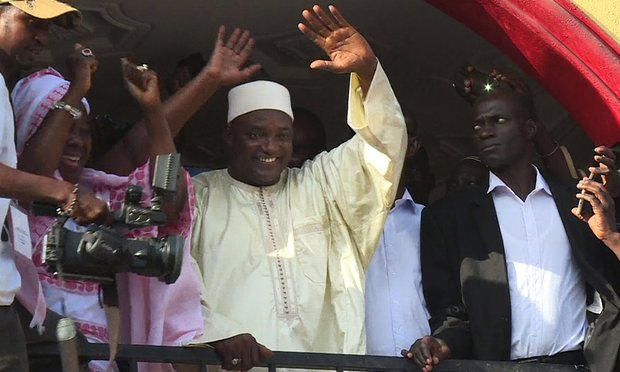The autocratic ruler of the Gambia will be prosecuted for his crimes within a year of handing over the reins of government in January, the chair of the country’s new ruling coalition has vowed.
Yahya Jammeh, whose defeat in last Thursday’s election marks the first democratic transition of power in the tiny west African nation, is being prevented from leaving the country in case he starts a rebel movement, according to Fatoumata Jallow-Tambajang, the architect of the coalition and a senior politician considered the mother of the nation.
In an extraordinary speech on Friday, Jammeh said he wanted to return to his farm to “eat what I grow and grow what I eat†– his favourite political slogan. But Jallow-Tambajang claimed that on this farm, in Kanilai, close to the Senegalese border, he had the “bunkers and treasure†to start an insurgency and the coalition feared he could move weapons out of the country.
“He can’t leave. If he leaves, he’s going to escape us,†she said. “We are stopping him from leaving. We are negotiating. He said he wants to go to Kanilai. Any day he tells us he wants to go abroad, then we say no. It’s the presidential prerogative.â€Â
She said the government wanted him prosecuted quickly in case he tried to flee – although it had not yet decided whether to try him in the Gambia or internationally. The government also planned to rejoin the international criminal court – Jammeh withdrew the Gambia from it, so the president who once vowed to bury opposition figures “nine feet deep†could find himself at The Hague.
Prosecution would not be immediate, first, things in the Gambia had to calm down, Jallow-Tambajang said, sitting outside the court where 19 political prisoners were freed on bail on Monday.
“Even if it [the constitution] said that he was to be prosecuted immediately, our government will not do so because of the volatility of the environment. The environment is complex – you see them?†she said, pointing at a large lorry full of soldiers speeding down the road past the court.
There was no question of immunity, however. “He will be prosecuted. I’m saying a year but it could be less than that,†Jallow-Tambajang said. “This is my personal opinion – it might have taken three months because we really want to really work fast.
“We don’t trust him. The longer we leave him, the more possibilities he has to leave the country, to escape from the country and to even do an insurgency. He is capable. The man is capable. In Kanilai, he has bunkers. I have reliable sources that [say that] he has bunkers. I have been reliably informed that he has treasure in Kanilai, he’s sitting on treasure, on gold as they say.â€
She said that although Jammeh insisted he wanted to stay on his farm, the new coalition – led by Adama Barrow, a former estate agent who once worked at an Argos in London – suspected him of wanting to move all the weaponry and soldiers he had there over the border to Casamance, in the south of Senegal.
“Senegal is very alert,†she said. “Nobody trusts him, so they are also taking their own measures to ensure that nothing goes in. Because if anything goes in he’s going to move all the ammunition to Casamance and start a rebel movement. He’s a rebel.â€
There was no deal between Jammeh and Barrow exchanging the acceptance of defeat for a promise of immunity, Jallow-Tambajang said.
“The only time he spoke to Mr Barrow in my presence was when he reluctantly conceded defeat and pledged to cede power from January 2017. There was no deal. We were resolved to really go up to the end. We knew we had won and we didn’t want to compromise any ethics.â€
When Jammeh realised he was losing the election, she said, he tried to stop the results from being announced. “But we insisted. [We were] determined to protest if the results were rigged. And he had no support from the international community, from the military, nor the police. He was isolated. He was compelled to take such a decision.â€
Jallow-Tambajang said Jammeh had petitioned to meet Barrow but that so far, the president-elect had refused because his predecessor was so unpredictable.
“He wants to meet Barrow. He has asked him to meet at his convenience, but we have decided not to meet him, because we don’t trust him. You can never take chances with Yahya Jammeh. That’s the level of distrust we have, that the population has. Our priority is the security of Barrow.â€
Jammeh had amassed “billions of dollars, pounds, whatever†in stolen wealth, she claimed, including from deceased dictators such as Gaddafi and Mobutu who lodged their assets in the Gambia – and one of the things the new government would do was try to get some of it back.
“We are going to have a national commission for asset recovery,†Jallow-Tambajang said. “We’re going to investigate, to follow up not only him but his wife. His wife is a gold-digger. She has emptied our coffers. Each time you see her here it’s to empty our coffers,†she alleged.
He even tried to take the British embassy’s land, she claimed. “They said no – you can’t joke with them. The man is wealthy.†theguardian
Â
Â
Â





